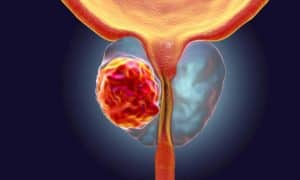The prostate is a gland in the male reproductive system. It lies just below the bladder (the organ that collects and empties urine) and in front of the rectum (the lower part of the intestine). It is about the size of a walnut and surrounds part of the urethra (the tube that empties urine from the bladder). The prostate gland makes fluid that is part of the semen. Prostate cancer occurs when some of the cells in the prostate reproduce far more rapidly than normal, resulting in a tumour. If left untreated, prostate cancer cells may eventually spread from the prostate and invade distant parts of the body, particularly the lymph nodes and bones, producing secondary tumours in a process known as metastasis.
One of the most worrying aspects of the disease is that most prostate cancers develop without men experiencing any symptoms in the early stages.
Risk Factors
There is no way to know for sure if you will get prostate cancer.
- Increasing age, genetics and environmental and geographical factors play a major role
- Prostate cancer has one of the strongest relationships between age and any human malignancy
- If one first-line relative has PCa, the risk is at least doubled. If two or more first-line relatives are affected, the risk increases by 5-11-fold. Small subpopulations of individuals with PCa (about 9%) have true hereditary PCa. This is defined as three or more affected relatives or at least two relatives who have developed early onset disease, i.e. before age 55
- But, dietary factors such as high consumption of fats – fatty acids, alpha linolenic acid found in red meat, etc., deficiency of trace element like selenium and low levels of vitamin D and E have also been implicated in increased risk of development of prostate cancer in some individuals
- Factors such as the foods consumed, the pattern of sexual behavior, alcohol consumption, exposure to ultraviolet radiation, chronic inflammation and occupational exposure may affect the risk of progression from so-called latent Prostate cancer (PCa) to clinical PCa.
Epidemiology of Prostate Cancer
- Prostate cancer has become a major public health problem in developed countries in the recent decade. Prostate cancer develops mainly in elderly males more than 50 years. It is the ninth most-common cancer in the world, but wide variations are seen globally
- Two thirds of cases of prostate cancer are diagnosed in more developed regions of the world and Prostate cancer is the second most common cancer in men worldwide
- In USA, prostate cancer accounted for 14% of all new cancer cases and 5% of all cancer deaths in the year 2014
- In India, the incidence of prostate cancer was less but is increasing gradually now due to increase in life expectancy, decreasing in mortality of older age group, and absence of regular screening procedures. Most of the patients are diagnosed in late stages making it resistant to treatment, worsening the prognosis, and decreasing the survival rate
Table 1: From GLOBOCAN 2012 Data
| Prostate Cancer | Incidence | 5 year Prevalence | Mortality |
| India | 19,095 | 63,818 | 12,231 |
| World | 11,11,689
|
39,23,668 | 3,07,471 |






